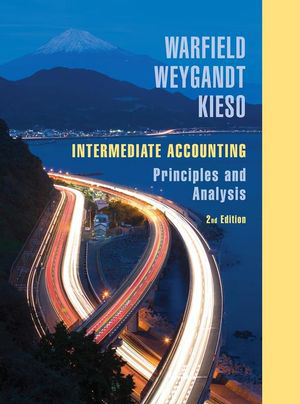
Intermediate Accounting: Principles and Analysis, 2nd Edition
By Terry D. Warfield, Jerry J. Weygandt, Donald E. Kieso
Intermediate Accounting: Principles and Analysis provides a solid foundation for instructors whose goal is to help accounting students to build an understanding of the principles, concepts, and methods of financial accounting and reporting. The course incorporates a more conceptual focus, and a pedagogy within each area of study, along with review materials to better enhance the connections between content and homework assignments.
Schedule a Demo Sign Up for a Test Drive Adopt WileyPLUSWant to learn more about WileyPLUS? Click Here
Read, Study, and Practice
Students learn course concepts using the complete online eTextbook, flashcards, crossword puzzles, practice questions, videos, and animations. Organized by learning objective, students can filter for relevant learning resources based on what they need to study most and print any section of the eTextbook.
ORION Adaptive Practice
Every student has a different starting point, and adaptive practice provides endless opportunities for practice to effectively prepare for class or quizzes and exams. Active retrieval of information with practice questions is proven to improve retention of information better than re-reading or reviewing the material, and students who use adaptive practice to prepare for exams do significantly better than those who do not. Students begin with a quick, chapter-level diagnostic to determine their initial level of understanding, and they can use the dashboard and quick reports to see what topics they know and don’t know.
Assignments
Students who fully engage in WileyPLUS assignments do better in the course by more than a letter grade. Auto-graded assignments give students immediate feedback based on flexible assignment settings determined by the instructor, while the notification center allows students to set their own email notification policies to stay on track.
Instructors can select from extensive and reliable question banks to create and deploy reading, practice, homework, pre-post lectures, and assessment assignments. This course includes essay, label drag-and-drop, multiple choice, text entry, and true-/false question types.
Gradebook
Students know where they stand on WileyPLUS assignments, and they can track progress by learning objective.
Instructors have insights into student performance at the granular question attempt and can track trends by individual student, assignment, or learning objective. Flexible policies allow instructors to change points, set assignment weighing policies, extend individual due dates, or drop the lowest grade.

Terry D. Warfield, Ph.D. is associate professor of accounting at the University of Wisconsin-Madison. He received a B.S. and M.B.A from Indiana University and a Ph.D. in accounting from the University of Iowa. Professor Warfield’s area of expertise is financial reporting, and prior to his academic career, he worked for five years in the banking industry. He served as the Academic Accounting Fellow in the Office of the Chief Accountant at the U.S. Securities and Exchange commission in Washington, D.C. from 1995-1996). Professor Warfield’s primary research interests concern financial accounting standards and disclosure policies. He has published scholarly articles in the Accounting Review, Journal of Accounting and Economics, Research in Accounting Regulation, and Accounting Horizons, and he has served on the editorial boards of the Accounting Review, Accounting Horizons, and Issues in Accenting Education. He has served as president of the Financial Accounting and Reporting Section, the Financial Accounting Standards Committee of the American Accounting Association (Chair 1995-1996), and on the AAA-FASB Research Conference Committee. Professor Warfield has received teaching awards at both the University of Iowa and the University of Wisconsin, and he was named to the teaching Academy at the University of Wisconsin in 1995. Professor Warfield has developed and published several case studies based on his research for use in accounting classes. Theses cases have been selected for the AICPA Professor-Practitioner Case Development Program and have been published in Issues in Accounting Education.

Jerry J. Weygandt, PhD, CPA, is Arthur Andersen Alumni Professor of Accounting at the University of Wisconsin-Madison. He has a Ph.D. from the Univ. of Illinois. His articles have appeared in the Accounting Review, Journal of Accounting Research, Accounting Horizons, Journal of Accountancy, and other academic and professional journals. Professor Weygandt is author of other accounting and financial reporting books and is a member of the American Accounting Association, the American Institute of Certified Public Accountants, and the Wisconsin Society of Certified Public Accountants. He is the recipient of the Wisconsin Institute of CPAs Outstanding Educator’s Award and the Lifetime Achievement Award. In 2001 he received the American Accounting Association’s Outstanding Accounting Educator Award.

Donald E. Kieso, PhD, CPA, received his bachelor’s degree from Aurora University and his Ph.D. from the University of Illinois. He has served as chairman of the Department of Accountancy and is currently KPMG Emeritus Professor of Accountancy at Northern Illinois University. He has public accounting experience with Price Waterhouse & Co. (San Francisco and Chicago) and Arthur Andersen & Co. (Chicago) and research experience with the Research Division of the American Institute of Certified Public Accountants (NY). He has done postdoctorate work as a Visiting Scholar at the University of California at Berkeley and is a recipient of NIU’s Teaching Excellence Award and four Golden Apple teaching Awards. Professor Kieso is the author of numerous other accounting and business books and is a member of the American Accounting Association, the American Institute of Certified Public Accountants, and the Illinois CPA Society.
Chapter 1. Financial Accounting and Accounting Standards
Chapter 2. Conceptual Framework Underlying Financial Accounting
Chapter 3. The Accounting Information System
Chapter 4. Balance Sheet
Chapter 5. Income Statement
Chapter 6. Statement of Cash Flows
Chapter 7. Revenue Recognition
Chapter 8. Cash and Receivables
Chapter 9. Accounting for Inventories
Chapter 10. Accounting for Property, Plant, and Equipment
Chapter 11. Intangible Assets
Chapter 12. Accounting for Liabilities
Chapter 13. Stockholders’ Equity
Chapter 14. Investments
Chapter 15. Accounting for Income Taxes
Chapter 16. Accounting for Compensation
Chapter 17. Accounting for Leases
Chapter 18. Other Reporting Issues.
A. Accounting and the Time Value of Money
B. Reporting Cash Flows
C. Using Financial Calculators
D. Retail Inventory Method
E. Accounting for Natural Resources
F. Accounting for Computer Software Costs
G. Accounting for Troubled Debt
H. Accounting for Derivative Instruments
I. Error Analysis.
Index

